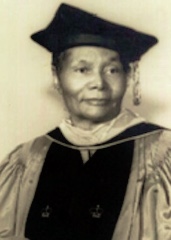Lillian Holland Harvey facts for kids
Lillian Holland Harvey (1912–1994) was an important American nurse, teacher, and doctor. She is known for making big improvements in medical education. Harvey also worked hard for equal rights for African Americans. She achieved many things at a time when both African Americans and women faced a lot of unfair treatment in schools and in healthcare. She was seen as a strong leader in her community.
Contents
Education and Her Career
Lillian Holland Harvey was an African American woman born in Holland, Virginia. After finishing high school, she moved to New York. There, she attended the Lincoln Hospital School of Nursing. Harvey earned her nursing diploma in 1939.
She then continued her studies at Columbia University, where she earned her bachelor's degree in 1944. Her strong desire to learn more and to teach others led her to get a master's degree. She completed this at Columbia University's Teachers College in 1948. Later, she went back to Columbia and earned her doctorate degree in 1966.
Leading at Tuskegee
The Tuskegee School for Nurses was a nursing school mainly for Black students. It started in 1892. In 1945, Harvey became the director of nurse training there. By 1948, she became the Dean of the school.
In 1949, she started a big change. She worked to turn the school's three-year nursing diploma program into a four-year bachelor's degree program. This was the first program of its kind in Alabama. By 1953, students could earn a Bachelor of Science in Nursing. The program became fully approved by the National League for Nursing in 1957.
Students in the program gained real-world experience. They worked at the John A. Andrew Hospital in Alabama. They also had chances to learn in other states like Massachusetts, Florida, New York, and Connecticut. Harvey served as the Dean of Nursing at Tuskegee Institute for 25 years. She retired in 1973.
After retiring, she stayed active. She was part of the National Negro Business and Professional Women's club. She also served on the Board of Directors of the National League for Nursing. Harvey was involved in many important groups. These included the American Red Cross and the Kellogg Foundation. She also advised a U.S. Public Health Service committee.
Important Achievements
Throughout her career and after, Lillian Harvey received many awards for her work.
- In 1982, she received the Mary Mahoney Award. This award came from the American Nurses Association.
- In 1992, the Tuskegee University Board of Trustees honored her. They named the Nurses Home "Lillian Holland Harvey Hall."
- In 1999, Harvey was chosen for the Alabama Healthcare Hall of Fame.
- She was also inducted into the Alabama Nursing Hall of Fame in 2001.
- The Alabama State Nurses' Association even created an award in her name.
Fighting for Civil Rights
Lillian Harvey was also very involved in the civil rights movement. She worked to end unfair separation (desegregation).
Training Nurses for Service
During World War II, Harvey worked to train Black nurses for military service. She helped create chances for them to join the Army Nurse Corps. She also worked to desegregate the Alabama Nurses’ Association. She would drive 80 miles from Tuskegee to Montgomery to attend their meetings. Even though she had to sit in a separate section because of her race, she spoke up. She strongly supported nurses and nursing students.
Advocating for Women
Harvey was also a member of the education committee for the President's Commission for the Status of Women (PCSW). This group was started in the 1960s. It focused on the changing roles of American women. They looked at jobs, home life, and civil rights.
Lillian Harvey was the only African American woman on the education committee. This committee talked about important social issues. These included the need for childcare and women's roles at home. Harvey specifically spoke about improving city areas. She wanted the African American community to support its own needs.
Personal Life
Lillian Harvey was married to Reverend Raymond Francis Harvey. He was a Baptist minister. They had three children together. Lillian Harvey passed away in 1994 at the age of 82. This was two years after her husband died.
Her Lasting Impact
Lillian Harvey's leadership helped many young African Americans. Her dedication as Dean of Nursing helped lead to more equal opportunities. This was true in both education and civil rights. Her work made a big difference for many people.


